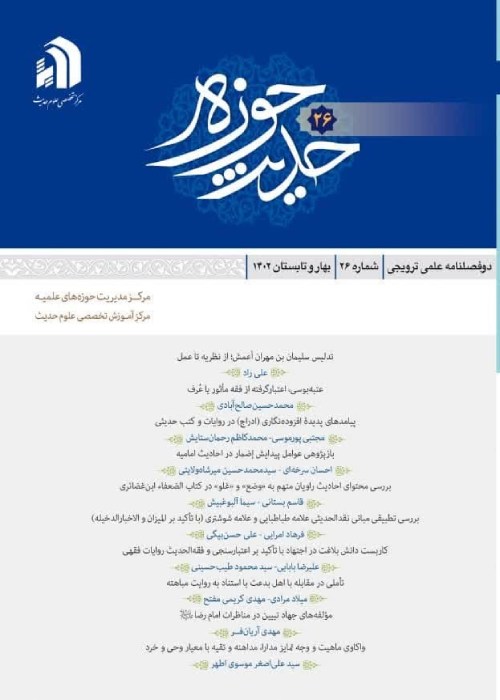A comparative analysis of the traditions of khums in Ṣaḥīḥ al-Bukhārī and al-Kāfī
The issue of khums (one-fifth levy) that has been mentioned in the Holy Qur’an and the Shi’a and Sunni traditions, is among the important Islamic laws to which the jurisprudents and the traditionists of Muslim denominations have paid attention. The Shi’a and Sunni scholars are in a serious diversity of opinions with regard to the instances and also those to whom the khums belongs after Prophet Muhammad (s.‘a. w.). Therefore, the analysis of the issue of khums in the two books: al-Jāmi‘ al- Ṣaḥīḥ by al-Bukhārī and al-Kāfī by al-Kulaynī, as the two reliable hadith collections in the eyes of the Sunnites and the Shi’ites respectively, is the main subject of this study. Having applied an analytical-descriptive method, this study attempts to analyze and compare the hadiths of khums in these two books. Since in these two books – and in most of the tradition books compiled by the early scholars – the authors have made themselves content with just mentioning the hadiths, the analysis of the traditions of khums and the way of their arrangement in these two books provides one with a valid understanding of the intellectual atmosphere of their compilers and the issue of khums. Based on what this study concludes, both compilers have the same opinion about the obligation (wujūb) of khums and some issues that belong to it like buried treasures (dafā’in), booties (ghanā’im), and tribute (fay’). Al-Kulaynī, however, has included the section of khums in the part of Shi’a doctrines and creeds in the Chapter of Proof (kitāb al-ḥujja) of his al-Kafi and paid attention to the ownership of the Infallible Imam over the khums. Similarly, in al-Kāfi the gold and silver mines, as well as the surplus of one’s profit in trading and tilling are introduced as what to which khums is applicable. But al-Bukhārī has mentioned the khums among positive rules derived from the sources of legal knowledge (furū‘ fiqhiyya) and has included it in the Chapter of Jihad. In the discussion of the ownership of the khums, he makes himself content with such generalities as applying the attribute of “distributer” (qāsim) and does not go to its details.
- حق عضویت دریافتی صرف حمایت از نشریات عضو و نگهداری، تکمیل و توسعه مگیران میشود.
- پرداخت حق اشتراک و دانلود مقالات اجازه بازنشر آن در سایر رسانههای چاپی و دیجیتال را به کاربر نمیدهد.


